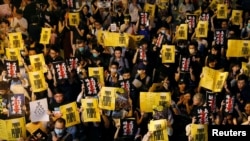The Chinese Embassy in Phnom Penh on Friday accused the United States of interfering and, in certain cases, abetting the Hong Kong pro-democracy protests, likening the alleged meddling to Cambodian complaints of U.S. interference in domestic affairs.
Chinese Ambassador Wang Wentian released a statement on Friday thanking Cambodia for its support of China’s core interests, while asserting that U.S. lawmakers were inciting the protestors. The accusation was made a day after the U.S. said it “is extremely concerned” about the critical situation in Hong Kong.
“The disgraceful role played by the US in the violence in Hong Kong reminds me of the ‘color revolutions’ in some countries in the Eastern Europe, the Central Africa and Asia,” Wang Wentian’s statement reads.
The reference to color revolutions finds resonance in Cambodia because the Phnom Penh government justified its 2017 crackdown on the political opposition, civil society groups and independent media with a concocted narrative of a U.S.-aided revolution in the country.
So far, pro-democracy protestors in Hong Kong have rallied for 10 weeks against an extradition bill that would allow criminals to be sent to mainland China for trial. The city-wide protests have escalated, leading to massive disruptions in the city, some deaths and the arrests of hundreds of protestors.
The U.S. “disrupts other countries’ internal affairs and overthrows their regimes in the name of democracy and freedom,” Ambassador Wang Wentian said in his statement, released on social media in three languages, Khmer, Chinese and English.
The Chinese ambassador said this was similar to alleged meddling in Cambodia’s internal affairs by “some external forces,” citing a recent Wall Street Journal story that reported Cambodia had plans to allow the Chinese military to use the Ream Naval Base in Preah Sihanouk province.
Emily Zeeberg, a spokesperson for the U.S. Embassy in Cambodia, did not comment on Ambassador Wang’s statement. Government spokesman Phay Siphan could not be reached for comment.
The U.S. and Chinese Embassies in Phnom Penh have frequently traded barbs in published statements or on social media, especially in relation to increased Chinese investment and presence in Cambodia, and their geopolitical legacies in the country.
Em Sovannara, an independent political analyst and teacher based in Phnom Penh, said the Chinese Ambassador’s statement was a political message to remind the U.S. and United Kingdom to not interfere in Hong Kong’s affairs.
“Britain and the U.S. always get themselves involved in the freedom of the Hong Kong people, which has concerned China. It has warned Western countries to keep their hands off [China’s] internal affairs,” said Em Sovannara.







